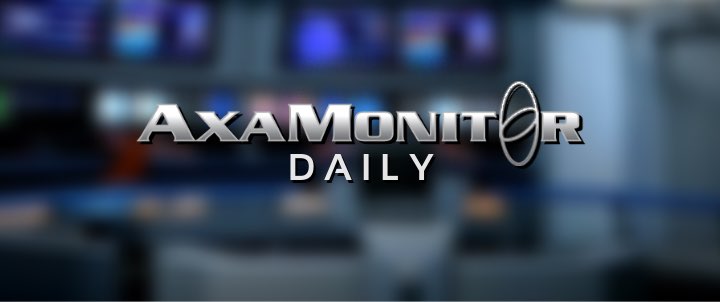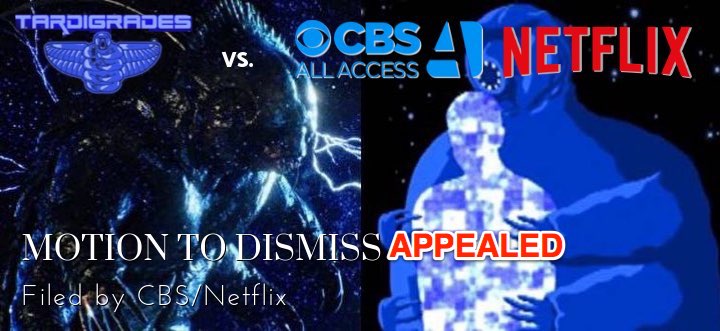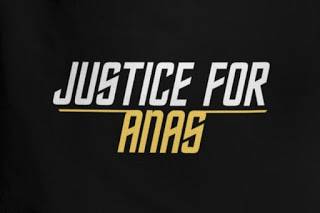This is an old revision of the document!
OCTOBER 12, 2019 | 8 MIN. READ | UPDATED NOVEMBER 5, 2019
Tardigrades Creator Appeals Star Trek Copyright Dismissal
YouTuber raises $20,000 in GoFundMe Campaign to Fund Anas Abdin’s Appeal in U.S. Second Circuit Court
Table of Contents
After seeing his copyright case against CBS and Netflix over Star Trek: Discovery dismissed in federal court last month, Tardigrades game creator Anas Abdin is appealing, with a YouTube conspiracist successfully leading a $20,000 GoFundMe campaign to pay for the appeal.
What the Appeal Looks Like
The appeal was formally filed in U.S. Second Circuit Court on October 1, 2019, by Abdin’s attorney John Johnson, though court filings do not yet cite the legal basis on which Abdin is appealing the dismissal by federal district Judge Lorna G. Schofield.
 SIGN UP You can subscribe to AxaMonitor Daily to be the first to read news stories like this from AxaMonitor.
SIGN UP You can subscribe to AxaMonitor Daily to be the first to read news stories like this from AxaMonitor.
« I have filed an appeal. As an independent creator, I found myself with no rights. If I don’t have rights, [neither] does everyone else. » — Tardigrades creator Anas Abdin
Surprise
The appeal came as something of a surprise after Abdin had first indicated he respected Schofield's decision. He explained in his October 11 blog post that he was convinced to appeal after talking to a prominent Discovery critic on YouTube.
How Appeals Work
Basic framework. Each party must submit a written brief. The briefs identify the issues for the court to consider, along with legal arguments to persuade the court. In some cases, the court may hear oral arguments for judges to ask questions and clarify issues. No witness testimony or new evidence is allowed.
Thus, in order to understand the lower court’s decision, the appeals court examines the entire record of the lower court proceedings. In this case, that is limited to all pleadings, pre-trial motions and exhibits.1)
Standards of review. Typically, a court will review the lower court’s record for legal errors. However, Anas Abdin’s case was resolved by a pre-trial motion to dismiss. So the circuit court will look at the case de novo — like new, as if the case had not been dismissed. That means a complete review of the lower court’s decision, including its findings of fact.2)
Legal Tactics
In a GoFundMe page created for him by Gary Buechler, AKA "Nerdrotic" on YouTube, Abdin describes how he wants to use money raised for his appeal, focusing on the following:
- Hiring computer network experts ($20,000-$35,000 per expert)
- Legal consultations ($1,000/hour for estimated $15,000 total)
- Marketing, promotion, media outreach
- Attorneys fees
- Court and administrative fees
More than $20,000 Raised
Following a weekend telethon on YouTube, Buehler’s GoFundMe quickly met his $20,000 goal, with donations continuing to trickle in to total $20,735 by November 6. The telethon raised more than the $5,000 Bueheler said Abdin told him he needed immediately to proceed with the appeal. Buehler provided no information about why that amount was needed in three days.
Not Enough Money
The GoFundMe’s $20,000 goal, however, would fail to pay for anything more than the plan to hire computer network experts. Despite asking for so much money, Abdin provides no justification in the GoFundMe story for these items in an appeal where these experts’ findings may not even be admissible (beyond the obvious attorney and court fees).
By Abdin’s own accounting, Buechler’s $20,000 goal falls short of what he says he needs to proceed with the appeal.
Expanded 'Defense' Team
In a statement on his blog, however, Abdin sheds more light on how he intends to use this money:
I want to expand my defense team with more consultants and technical experts.3)
That expanded team would appear to include:
- Computer network experts. Though he doesn’t explain the need for these experts, it’s likely Abdin wants to pursue the assertion in his original legal complaint that someone among the creators of Star Trek: Discovery accessed his unfinished game‘s profile on the Steam gaming platform. Though they specifically were given time by the judge to obtain and analyze Discovery-related computer records, Abdin’s attorneys proved unable to provide any evidence to support the claim. That may have been due to not having the resources or expertise to analyze the records CBS provided.
- Legal consultants. Given the weaknesses Schofield found in case, Abdin appears to believe his appeal would benefit from hiring experts in copyright law.
« Every similar element is actually unprotectable, leaving the peculiar situation where the works look exceptionally similar but the court decides no infringement has occurred. » — Washington Journal of Law, Technology & Arts
Problems with Appeal Strategy
Abdin’s appeal plan suffers from some problems out of the gate, including:
- Abdin is the plaintiff not the defendant in the case. He continues to bear the burden of proof in the case.
- No new evidence or witness testimony is allowed in an appeal. While the court considers such an appeal as if no judge had previously ruled, it is limited only to considering the same pleadings and evidence Schofield did.
Assumed Factual
A big challenge faced by the appeal is that Schofield’s decision already assumed all the facts in Abdin’s complaint were true and still found he had no case. The Second Circuit court will also make the same assumption, applying the same test for copyright infringement Schofield did.
Copyright Test
The Second Circuit, which includes Schofield’s Southern District of New York, applies a specific test for determining whether a work has been infringed. She applied the “More Discerning Ordinary Observer Test,” to decide whether Tardigrades and Discovery are substantially similar.
Using that test, the circuit court must set aside elements of the works that aren’t eligible for copyright protection, and then examining whether the protectable elements that are left, “standing alone, are and only then does the court apply the stricter “more discerning ordinary observer test” to find substantial similarity.4)
No Infringement
The Washington Journal of Law, Technology & Arts explains the principle Schofield employed in examining the several similarities between Tardigrades and Discovery, finding “every similar element is actually unprotectable, leaving the peculiar situation where the works look exceptionally similar but the court decides no infringement has occurred [with] unprotected elements, and thus subject to copying without infringement.”5)
Superficial Similarities
What similarities she did find, Schofield determined, were ”not actionable.“ Where Abdin had tried to argue his characters had been copied by Discovery’s creators for the characters of Burnham, Stamets, Culber and Tilly, the judge found “the alleged similarities between … characters in the two works also fails to support a claim, as they are mostly generalized non-protectable descriptions.”
The circuit court will have to determine whether Schofield ruled correctly about the many dissimilarities she found between the two works.
Doomed anyway?
Even if Schofield had allowed the lawsuit to move forward, Abdin’s attorneys had already conceded important parts of the case:
- Late copyright registration. Abdin registered his copyright too late — long after Discovery had already aired — to seek more than actual financial damages suffered by his videogame. That wouldn’t have amounted to much given the game has never been released.
- Attorneys’ fees and statutory damages. Even if Abdin had prevailed in court, the late registration also meant he could not seek attorneys’ fees or statutory damages. There was very little left for Abdin to win in the case.
Expedited Appeals Calendar
Under Second Circuit rules, the court considers appeals to dismissal motions on an expedited calendar. The clerk notifies the parties when an appeal is placed on the expedited calendar and sets the briefing schedule:6)
1. Abdin’s appeal brief is due 35 days from the date of the clerk’s notification.
2. CBS will have 35 days from Abdin’s filing to file its appeal brief.
3. Abdin will then have 14 days from CBS’ filing to file a reply.
Why This Matters
Abdin’s lawsuit had become a cause célèbre among Discovery critics like Buechler, using the suit to make their case this latest Star Trek series was unoriginal and fundamentally flawed. Abdin’s appeal has become a lightning rod for some fans of traditional Star Trek who have rejected Discovery, as well as others still smarting from CBS’ copyright lawsuit against Axanar and and its producer, Alec Peters.
Abdin's career options
Despite the worry in his blog post after the case was dismissed, little about the ruling affects his ability to complete and release Tardigrades. While he has previously fretted people would assume he copied Discovery, the judge’s ruling shows the two works were effectively developed independently. 
COMMENT & SHARE
Discuss this article in AxaMonitor's Facebook group or share on:
Keywords



